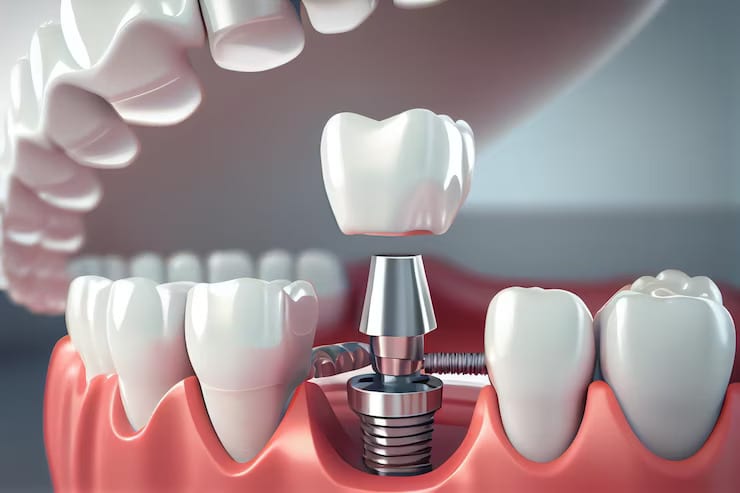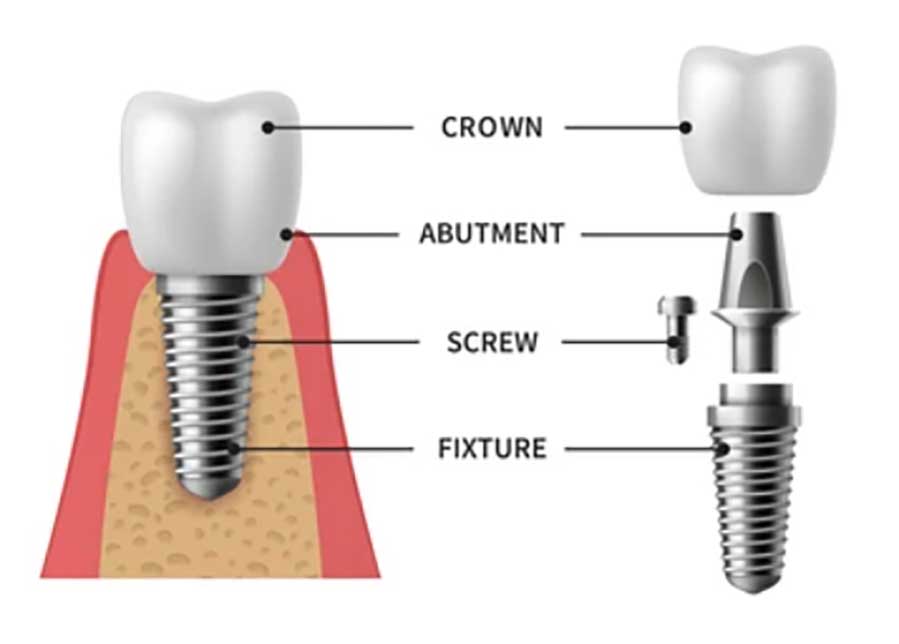Dental Care Centerburg OH Affordable Dental Implants: A Guide
Dental Care Centerburg OH Affordable Dental Implants: A Guide
Blog Article
Johnstown Dental Granville OH The Benefits of Dental Implants: Why Choose Them?
Dental implants have emerged as a preferred alternative for individuals looking for a long-term answer to tooth loss. One essential aspect of understanding dental implants involves their effect on adjacent teeth. This is particularly important for ensuring the health and longevity of the complete dental structure.
When a dental implant is positioned, it mimics the function of a natural tooth root. By doing so, it helps maintain the integrity of the surrounding bone structure. Natural teeth depend on a balanced, interconnected system for help, and dental implants can contribute positively to that dynamic. The stability provided by the implant permits for higher distribution of bite forces, which might prevent undue stress on adjacent teeth.
Premier Dental Condit OH Types of Dental Implants
In cases the place a tooth is missing, the neighboring teeth could shift into the vacant space. This shifting can lead to misalignment and varied other complications. By putting a dental implant, the danger of this shifting is reduced, because the implant acts as a placeholder that preserves the natural alignment of surrounding teeth. This preventive impact is crucial for long-term oral health and function.
Another essential consideration is bone loss. When a tooth is lost, the jawbone within the space can begin to deteriorate because of a scarcity of stimulation. Dental implants assist prevent this bone loss by offering the necessary stimulation to the jawbone, very comparable to a natural tooth root would. This preservation of bone not only helps the implant itself but additionally contributes to the soundness of adjacent teeth.
The kind of material used in dental implants, typically titanium, has a novel property of osseointegration, that means it fuses with the bone over time. This integration provides a sturdy foundation for the artificial tooth while ensuring that the implant doesn’t negatively have an effect on surrounding structures. As the implant integrates, it creates an environment that contributes positively to the health of the adjacent teeth.

Regular dental check-ups play a vital role in monitoring the influence of dental implants on adjacent teeth. Professional assessments can help establish any points that may come up, ensuring immediate therapy and maintaining the health of the whole dental arch. These evaluations may embody X-rays to verify for bone density and the overall condition of the implant and surrounding teeth.
Pediatric Dentist Hartford OH Full Mouth Dental Implants: An In-Depth Overview
Oral hygiene practices are vital for individuals with dental implants. Proper brushing and flossing habits not solely contribute to the longevity of the implant but in addition be positive that adjacent teeth remain healthy. Food particles and plaque that accumulate across the implant could cause problems, together with peri-implantitis, an inflammatory condition that may have an result on surrounding teeth and tissues.
The positioning of dental implants can affect the health of adjacent teeth. If an implant is placed at an angle or not correctly aligned, it might lead to increased stress on neighboring teeth. This misalignment may cause wear and tear on adjacent enamel, doubtlessly leading to cavities or other dental points. Therefore, the ability and expertise of the dentist performing the implant procedure are paramount in achieving a profitable end result.
In some cases, extra procedures may be needed to organize the surrounding area for an implant. Bone grafting or sinus lifts may help create a better environment for the implant. While these procedures are geared toward enhancing the location for the implant, they also serve to guard the health of adjacent teeth by making a more stable basis.
Dental Care Associate Centerburg OH The Benefits of Dental Implants: Why Choose Them?

As dental expertise evolves, advancements in implant techniques result in higher outcomes. Improved imaging techniques and computer-aided design enable for more exact placements that reduce risk to adjacent teeth. With these advancements, the chance of problems that might arise from improperly positioned implants diminishes significantly.
Post-operative care additionally plays a important position in ensuring that adjacent teeth stay unaffected. Patients must adhere to the dentist's directions relating to food plan, oral hygiene, and follow-up visits. Neglecting these tips may lead to issues that influence not only the implant but additionally the neighboring teeth.
Dental Care Associate Condit OH Understanding the Cost of Dental Implants (2024 Edition)
In conclusion, dental implants, when positioned accurately and cared for correctly, have the potential to boost the health of adjacent teeth rather than detract from it. They maintain alignment, stimulate bone growth, and provide a secure foundation that supports the entire dental structure. Understanding how dental implants affect adjacent teeth emphasizes their importance as a long-term tooth replacement solution. With continuous advancements in technology and strategies, the combination of dental implants into restorative dentistry is changing into more and more profitable, making certain healthy and useful smiles for years to return.

- Dental implants prevent adjacent teeth from shifting into the hole created by a missing tooth, helping to take care of correct alignment within the mouth.
- The rebuilding of the jawbone through an implant can stimulate surrounding teeth and keep them healthy by providing needed bone density which may in any other case diminish.
- Adjacent teeth profit from the stabilization that dental implants provide, lowering the risk of damage and tear from misalignment throughout chewing.
- Implants can defend adjacent teeth by performing as a framework, which can distribute bite forces evenly across the dental arch as an alternative of inserting undue stress on neighboring teeth.
- When positioned correctly, dental implants minimize the risk of gum disease which can have an result on adjacent teeth by sustaining a clear and healthy gum line.
- The presence of an implant can facilitate an improved oral hygiene routine, as it eliminates the need for bridgework that could trap food particles around adjacent teeth.
- Regular dental check-ups can reveal how well the implant integrates with surrounding buildings, making certain ongoing health for adjacent teeth.
- Implants can prevent the natural means of bone resorption that happens after tooth loss, positively impacting the steadiness and longevity of adjacent teeth.
- The use of dental implants might reduce the necessity for more invasive procedures in the future, providing a long-term solution that maintains the structure of the entire dental arch.
- Successful integration of an implant into the dental arch enhances general oral perform, often resulting in improved confidence and oral health for adjacent teeth.undefinedHow do dental implants have an effect on adjacent teeth?
What impact do dental implants have on the alignment of adjacent teeth?
Dental implants generally prevent the shifting of adjacent teeth, helping to keep up proper alignment. This stability can reduce the chance of growing chunk points over time.
Can dental implants cause injury to nearby teeth?
When placed correctly by a certified skilled, dental implants shouldn't injury adjacent teeth - Dentists Centerburg OH. However, improper placement or inadequate planning could result in problems
Dental Implants Columbus OH Affordable Dental Implants: Finding the Best Value
Do dental implants require any particular care relating to adjacent teeth?
Maintaining good oral hygiene is important. Surrounding teeth ought to be brushed and flossed frequently, and routine dental check-ups will help be sure that both the implants and adjacent teeth remain healthy.

Will dental implants impression the health of my surrounding teeth?
Dental implants can improve the health of surrounding teeth by distributing bite forces evenly, reducing wear and tear. Additionally, they will prevent bone loss within the jaw, which can have an effect on adjacent teeth.
Dentist Office Johnstown OH Frequently Asked Questions About Dental Implants
Are there any long-term results of dental implants on this website nearby teeth?
Long-term, dental implants might help protect the health of adjacent teeth by stopping shifting and potential gum issues, ultimately contributing to raised oral health overall. - Dental Clinic Columbus OH
Can gum problems come up round adjacent teeth after getting implants?
If correct dental care is neglected, gum points may develop round both the implants and adjacent teeth. Following post-operative care directions is essential to reduce these risks.
Dentist New Albany OH Understanding Dental Implants: A Comprehensive Guide
How do dental implants examine to bridges in phrases of adjacent teeth?
Dental implants are sometimes useful as they don’t require alteration of adjacent teeth, not like bridges, which necessitate reshaping of close by teeth for help. (Johnstown Dental New Albany OH)
Can I nonetheless get cavities in adjacent teeth if site link I have dental implants?
Yes, adjacent teeth can still develop cavities if not properly cared for. Dental implants themselves can't get cavities, however they require vigilant hygiene practices to protect surrounding natural teeth.
What is the success rate of dental implants in relation blog here to surrounding teeth?
The success rate of dental implants is high, nevertheless it largely is determined by the standard of the process and ongoing care. Well-maintained implants usually lead to higher outcomes for adjacent teeth as properly.